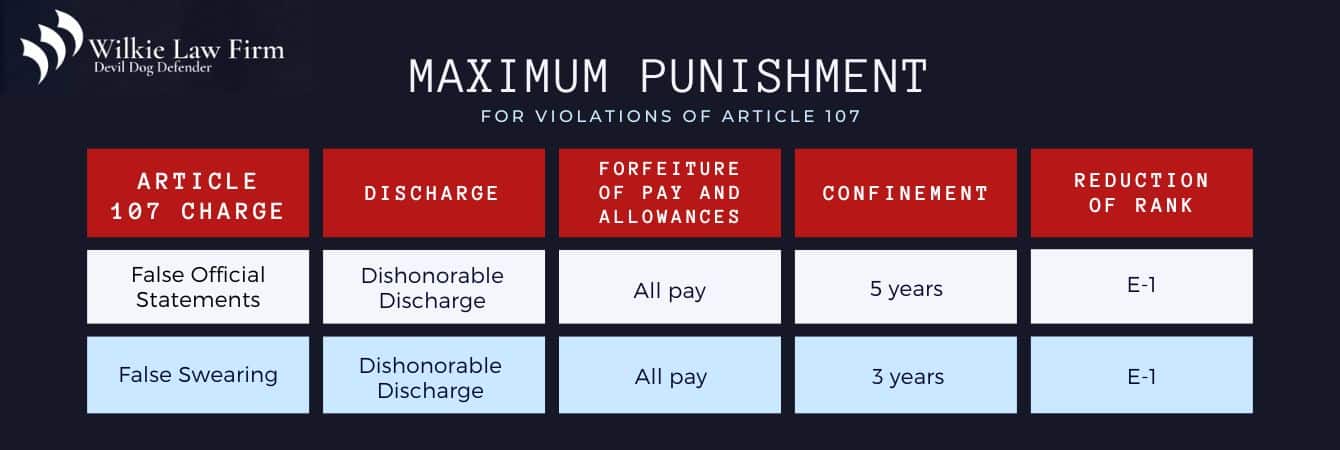Article 107 UCMJ
Military Defense Attorney for Article 107 Violations
Home » Article 107 UCMJ
Military Counsel
UCMJ Articles
UCMJ Article 107 – False Official Statements
Table of Contents

In addition to following common law that all United States citizens are subject to, members of the United States military are required to follow a separate set of statutory laws that are unique to service members. This distinct code of laws is what is called the Uniform Code of Military Justice, or as it is more commonly known, the UCMJ.
Contained within the UCMJ are numerous articles that highlight different rules, regulations, and violations of military law. The primary purpose of these articles is to maintain morale, good order, and discipline within the armed forces.
Below, North Carolina military defense attorney Aden Wilkie of the The Wilkie Law Group explains the details surrounding UCMJ Article 107, which covers making false official statements as a member of the armed forces.
What is Article 107 of the UCMJ?
Article 107 of the UCMJ covers the offense of knowingly making false official statements or falsely swearing under oath. Under 10. U.S.C. 907 – Art. 107, any person subject to this chapter and who knowingly violates it will be punished as directed by a court-martial. More specifically, the statute states:
(a) FALSE OFFICIAL STATEMENTS. –
Any person subject to this chapter who, with intent to deceive–
- Signs any false record, return, regulation, order, or other official document, knowing it to be false; or
- Makes any other false official statement knowing it to be false.
shall be punished as a court-martial may direct.
(b) FALSE SWEARING. –
Any person subject to this chapter–
- Who takes an oath that–
- Is administered in a matter in which such oath is required or authorized by law; and
- Is administered by a person with authority to do so; and
2. who, upon such oath, makes or subscribes to a statement;
if the statement is false and at the time of taking the oath, the person does not believe the statement to be true, shall be punished as a court-martial may direct.
Elements of Article 107 UCMJ
False Official Statements
By definition, the elements that are required for an Article 107 (False Official Statements) charge include:
- The accused signed a certain official document or made a certain official statement;
- The document or statement was false in certain particulars;
- The accused knew it to be false at the time of signing it or making it;
- And the false document or statement was made with the intent to deceive.
By “intent to deceive,” the statute refers to any totally false or misleading information which the accused knows to be false or misleading and for which the purpose is to convince another that it is in fact a true statement.
What is Considered an Official Statement in the Military?
To determine whether a statement is considered official or not, it must be shown that an official government function was negatively impacted by the statement in question. As such, a clear and direct relationship to official duties must exist.
A statement is considered to be official in the military when the maker of the statement is 1) acting in the line of duty; 2) relates directly to their official military duties; or 3) the person receiving said statement is a service member carrying out official duties or a civilian performing a military function¹ when the false statement is made. A false official statement also does not require the service member to benefit from any material gain, although any lack or evidence of material gain can be used as circumstantial evidence to support the service member’s alleged intent to deceive.
False Swearing
By definition, the elements that are required for an Article 107 (False Swearing) charge include:
- The accused took an oath (or equivalent);
- The oath was administered to the accused in a matter in which was required or authorized by law;
- The oath was administered by a person having the authority to do so;
- Upon this oath, the accused made or subscribed a certain statement;
- Such statement was false;
- And the accused did not then believe the statement to be true.
What is Considered False Swearing in the Military?
Under military criminal law, when a service member makes a false statement (either written or oral) under lawful oath or the equivalent of such, they are engaging in deceptive practices that constitute false swearing. This differs from making false official statements in that 1) the statement does not need to be “official,” and 2) there is no burden of proving the intent to deceive.
Note that there is a critical distinction between false swearing and perjury. “Oaths” in regard to Article 107 are not the same as statements that are made in judicial proceedings, as these statements would fall under the charge of perjury as found in Article 131 of the UCMJ.
What is the Punishment for UCMJ Art. 107 Charge?
As prescribed by the Manual for Courts-Martial, the maximum punishment for making false official statements in the military includes a dishonorable discharge, a total forfeiture of all pay and allowances, a reduction in rank to E-1, and up to five years of confinement.
If found guilty of false swearing, the maximum punishment includes dishonorable discharge, forfeiture of all pay and allowances, a reduction in rank to E-1, and up to 3 years imprisonment.
Attempts – UCMJ Article 80 – are the only lesser-included offenses for a violation of Article 107.

Article 107 UCMJ Violation Defenses
Remember, in order for an Article 107 charge for false official statements, the statement must legally be considered official. This means that official military functions were somehow affected in a negative manner by these false statements. As a result, the prosecution must prove that the statements relate to official functions and that these official duties fall within the UCMJ’s reach. The other essential element for an Article 107 conviction for false official statements is that the accused intended to purposely mislead another.
When you equip yourself with the help of an experienced civilian-military defense counsel, you ensure that the charges against you are fought aggressively from the very beginning of your case. Your Jacksonville criminal defense attorney at The Wilkie Law Group will craft a strategic defense in order to create reasonable doubt surrounding your case and work to prove that the alleged violation does not meet all the elements required of Article 107 UCMJ.
North Carolina Defense Attorney for Article 107 Violations
Aden Wilkie, aka the Devil Dog Defender, practices both civilian criminal law and military criminal law. As a private attorney, he is able to consider the best interests of his clients above all else with no threat to his own career or chain of command. He uses his extensive knowledge, resources, skills, and experience to defend service members facing UCMJ charges and works hard to achieve the best possible outcome on their behalf. What’s more, in addition to curating a solid legal defense and protecting your rights and future, Aden is also happy to provide military record-correcting services as well as military discharge upgrade counsel.
Located in Jacksonville, NC, Aden Wilkie services the armed forces at Camp Lejeune and Fort Bragg as well as other bases, camps, stations, and posts across the nation. Call 910-333-9626 today for a consultation or complete our online intake form to learn more.
Footnotes
¹ Note that statements made to civilian authorities fall under the scope of this violation, as well. However, in civilian investigations, unless they relate to one of the circumstances mentioned above, a false or misleading statement to civilian law enforcement authorities is not considered an “official” statement, meaning it cannot be prosecuted under Article 107.
Contact an Article 107 Counseling Attorney
It is vital to use the knowledge of a seasoned attorney to organize and prioritize the material to present to the command. Call The Wilkie Law Group at 910-333-9626 to arrange your consultation.





